(Texts: All Artifacts, Color Coding, & Writings in Bold Type With Italics Inside Parenthesis, are Added by Editor R. Brown, not the Authors, Translators, or Publishers!)
(gods in blue … mixed-breed demigods in teal)
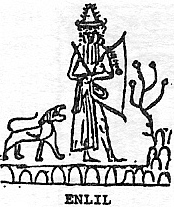
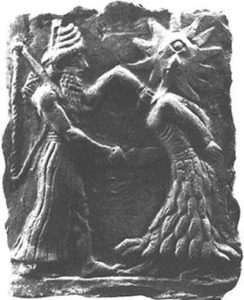 (alien Royal Prince Enlil, King Anu‘s son & heir)
(alien Royal Prince Enlil, King Anu‘s son & heir)
[For the god Enlil], king of the gods, valiant, who drives out the enemies in battle,
[…] the sublime, who walks at the side of the king — his favorite —
the one who conquers the enem[ies …] … — which is in Nippur (Duranki) — great lord, [his lord]:
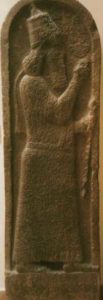
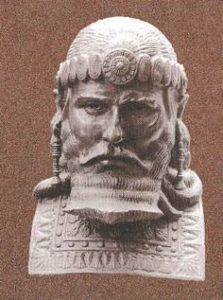 (giant mixed-breed & “mighty man” King Esarhaddon)
(giant mixed-breed & “mighty man” King Esarhaddon)
[Esarhadd]on, great king, mighty king, king of the world, king of Assyria,
king of the four quarters (of the world), [governor of] Babylon, king of the land of Sumer and Akkad,
(semi-divine offspring) selected by the steadfast heart of the god En[lil];
[who from] his childhood [trus]ted in the gods Aššur (Ashur), Enlil, Sîn (Nannar), Šamaš (Utu), Adad,
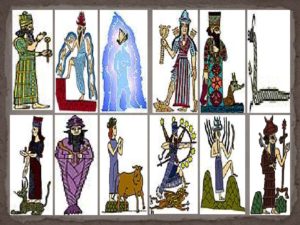 (top panel of gods: Ashur, Enki, Enlil, Inanna, Marduk, Ningishzidda‘s snake symbol; bottom panel: Nabu, Nergal, Ninhursag, Ninurta, Utu, & Nannar)
(top panel of gods: Ashur, Enki, Enlil, Inanna, Marduk, Ningishzidda‘s snake symbol; bottom panel: Nabu, Nergal, Ninhursag, Ninurta, Utu, & Nannar)
Marduk, Nabû, Nergal, and the (other) great gods, [his] lords,
(who) allowed him to attain his desire; (the one who) recognized their power,
(the one) over [whom] (the gods) extended their eternal protection
[in order to appease] their divine [he]art(s) and set their mind(s) at rest;
[(the one who) by the might of the gods Aššur], Enlil, Bēl (Marduk), and the Son-of-Bēl (Nabû),
the gods, his helpers, ruled over all lands and (10) made [all ru]lers submissive to him;
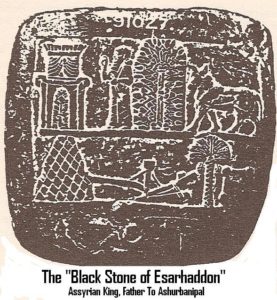
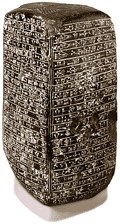 (Esarhaddon; Esarhaddon text artifact)
(Esarhaddon; Esarhaddon text artifact)
[the one who (re)constructed the temple of the god Aš]šur, renovated Ekur, (re)built Esagil and Babylon,
[completed] the sanctuaries and cult centers, (and) (re)confirmed (their) sattukku offerings;
[the king during the days of] whose [reign] the great lord, the god Marduk,
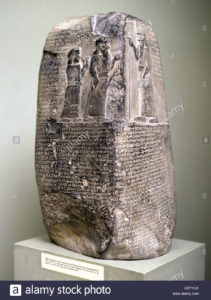 (mixed-breeds queen & king stand before giant alien god Marduk)
(mixed-breeds queen & king stand before giant alien god Marduk)
became reconcil[ed] to Babylon (and again) took up [his] residence [in Esagil], his [palace];
(the one who) made [the god Great-Anu] enter [into his city Dēr and his temple Edim]galkalama
(“House, Great Bond of the Land”) and had (him) sit upon (his) [eternal] dai[s; …]
[…] … […] and [make] his name (and) his descendant(s) [disappear] from [every land]!